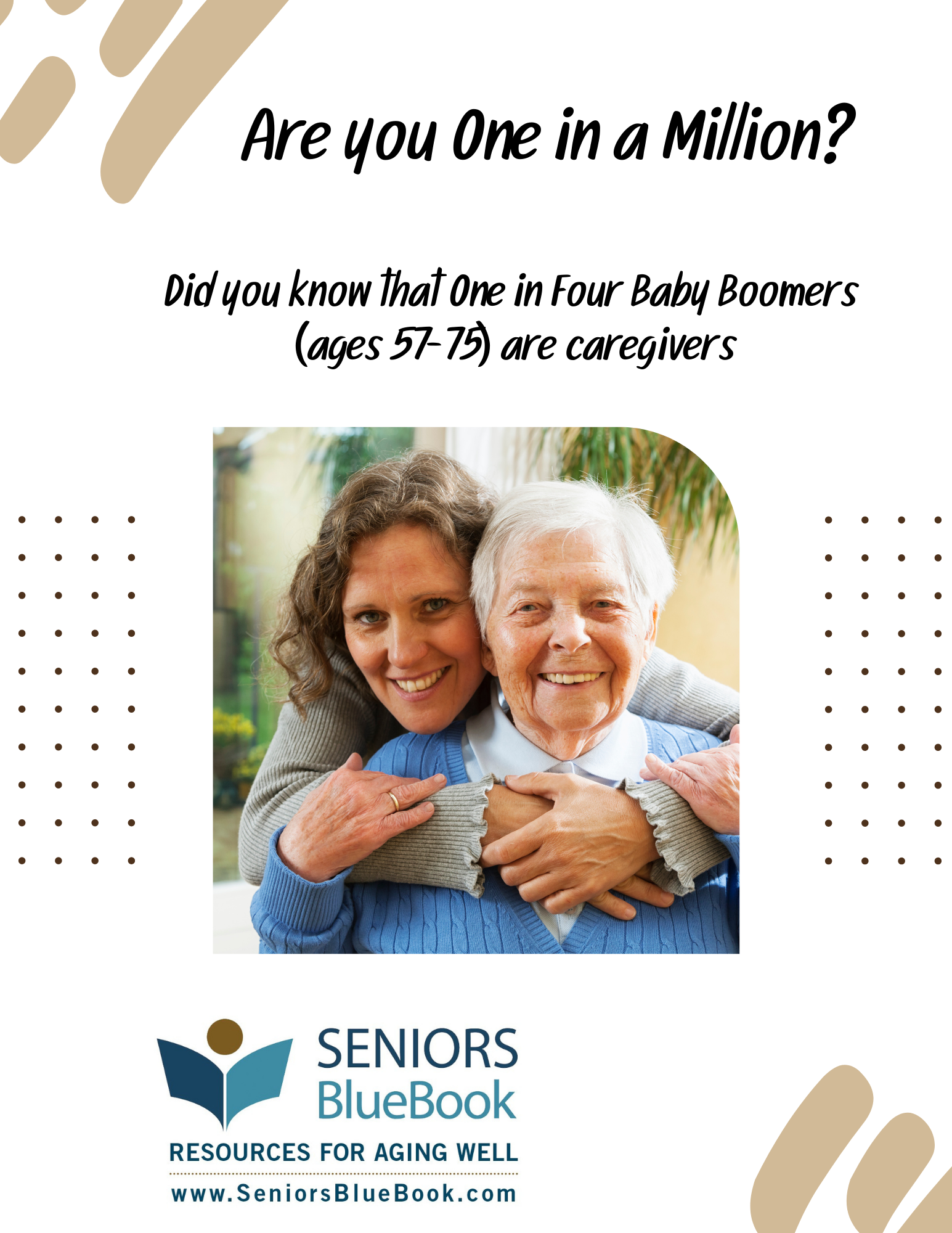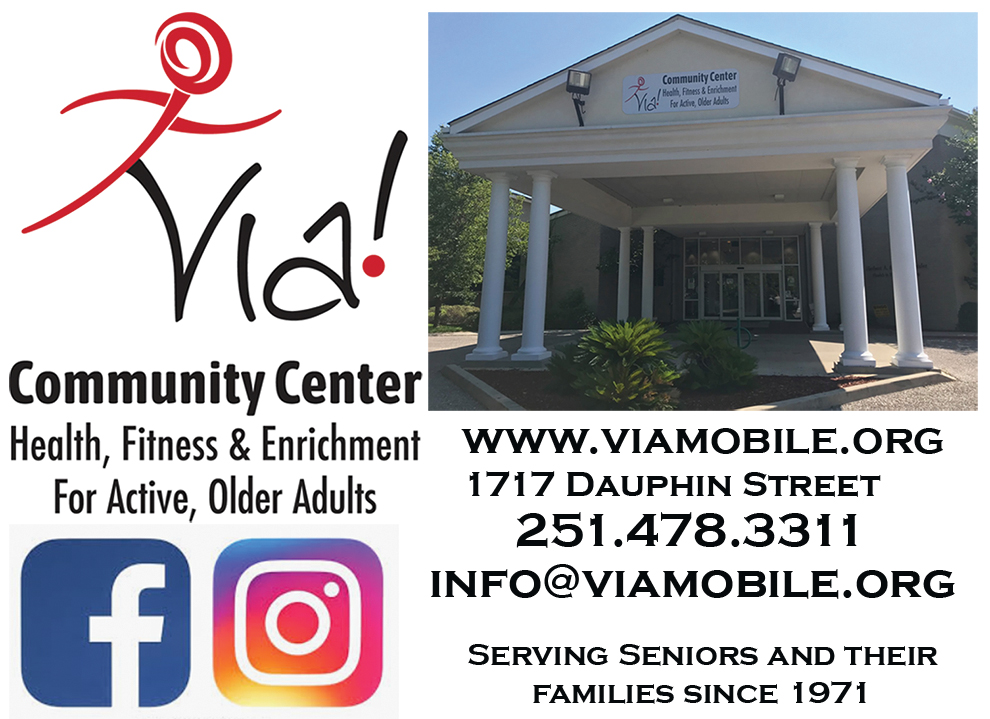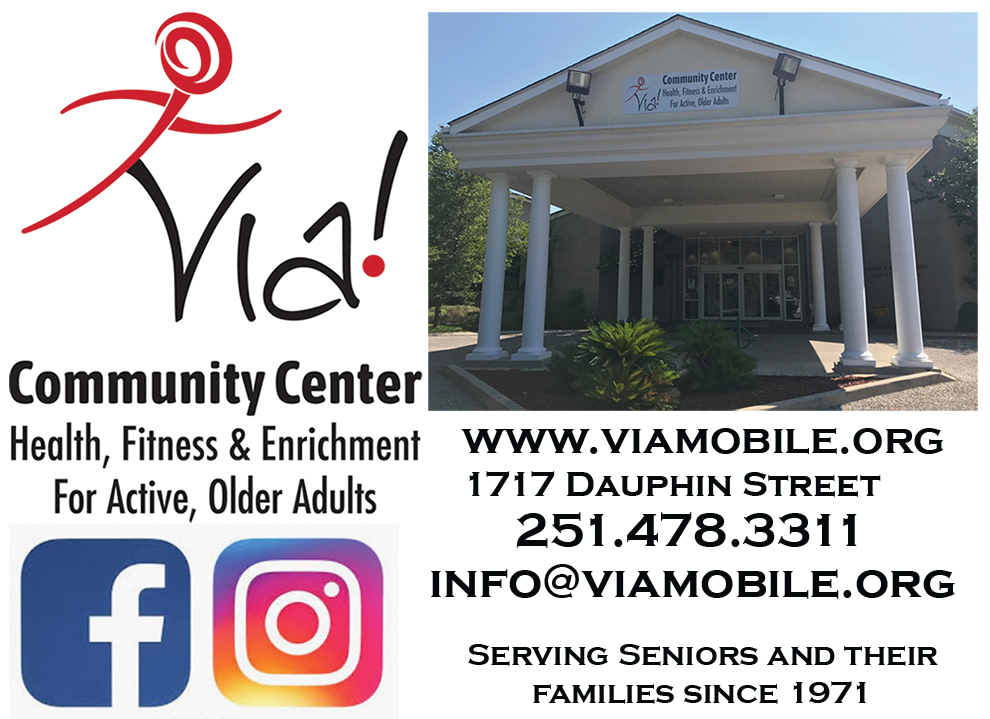Are You One in Four of the Baby Boomer Caregivers?
Via! Community Center
For more information about the author, click to view their website: Via Health Fitness and Enrichment Center
Jun 29, 2022
Alabama - Gulf Coast
Email US
Click to Email UsIf you are a Caregiver, you are one of the 1.8 million Caregivers in Alabama.
One in four Baby Boomers (ages 57-75) are caregivers, providing regular assistance to friends or family who have a disability or health problem. The burden of caring for a loved one can be time-consuming, expensive and can cause Caregivers to become depressed and feel guilty about their decisions.
“Caring for the Caregiver” is Relatively New
Until the late 70’s, Caregivers were an unseen, unheard and unrecognized part of the healthcare team. These families and friends were caring – primarily at home - for loved ones with cognitive disorders like Alzheimer’s disease, strokes and other age-related diseases. The first national caregiving organization was founded in 1977 – the National Caregiving Alliance – to raise awareness. This was followed by a 2016 reauthorization of the Older American Act of 1965 to assist Caregivers, the RAISE Family Caregivers Act of 2018 and the National Family Caregivers Support Act in 2000. Recently, the national CARES Act (Coronavirus legislation) also includes caregiving support provisions.
I Can’t Take Care of You, If I Don’t Take Care of Me
Both the Caregivers and the cared for can experience similar emotions. As days, weeks and months continue with mounting responsibilities, Caregivers can become overwhelmed physically, emotionally, spiritually and develop significant health problems. They worry their compassion is faltering (compassion fatigue) and experience guilt (Caregiver Guilt Syndrome) they are not doing enough for their loved one. Caregiver assessments reports that 20% of family caregivers suffer from depression, twice the rate of the general population. Meanwhile, those in their charge also can experience anxiety, frustration and depression.
Options for Caregivers and Their Charges
As many Caregivers need to work or be away from home for most of the day, AARP recommends adult daycare as a more affordable option (ranging from $50 - $70 per day) for Caregivers respite. When older loved ones are unable to structure one’s activities, feel isolated and lonely, have difficulty starting and focusing on activities and no longer seem safe on their own, adult daycare provides watchful care and socialization. An adult daycare is typically a non-residential facility that supports the health, nutritional, social and daily living needs of older adults.
Caregiver support is built into the program, with counselling and other support services. Caregivers are provided daily respite to continue to live their own lives, work and take care of other family members and obligations.
Other options for Caregiving respite include home health care, assisted living facilities and nursing homes. The best advice is to know your healthcare plan and options: Medicare now offers long-term home and community-based services, like adult day care, in-home personal care assistance, and respite care in certain conditions; Medicaid can pay 100% of nursing home care costs if you meet eligibility requirements; and private health insurance companies typically offer some respite care assistance. Local resources for Caregivers can be found on the Area Agency on Aging website listed under programs: Alabama Cares Caregiver Program.
Article courtesy of the Via Health, Fitness and Enrichment Center Community Outreach Division. The Via Center provides health, fitness and enrichment programs for older adults and Community Outreach services to Seniors and their families. For information on
the Via Center GrandFriends Adult Day Services program, contact 251.478.3311.
Other Articles You May Like
Estate Plan Check-Ups
Estate Plan Check-UpsEffective estate planning is personal, and its more than just deciding who to leave your assets to once you die. Effective estate planning is a comprehensive process that encompasses pre-need planning: health care decisions, financial management, and maintaining a delicate balance between independence and security. Like your preventive doctor visits, you should regularly check in on your estate plan to ensure it fits your current needs, considers and plans for potential future care needs, and will give effect to your wishes now and in the future. Generally, estate planning involves creating a last will and testament, possibly a revocable trust, possibly an asset protection trust or a supplemental needs trust for a loved one who is unable to manage finances or may be vulnerable to abuse or exploitation. Estate planning also involves important advanced directives, such as a durable financial power of attorney, a health care power of attorney, and a living will. Creating an estate plan, or getting my affairs in order, tends to be an item on our to-do lists, for us to get done and move on to the next thing. However, while it may not be something you have to look at every month, or even every year, once your initial estate plan is completed, it is something that needs to be reviewed with some regularity.Most people get an annual physical when they are healthy, not when they are sick. They do this because they want to proactively spot any issues that could cause them to become ill in the future. The same concept can and should be applied when it comes to reviewing and updating your estate plan. Your estate plan may be healthy now, but you want to make sure that it stays that way by checking it regularly, to ensure it fits your needs and family circumstances, protects and provides for you now, and accomplishes your goals and wishes in the future. Editors Note: This article is for informational purposes only and is not intended to be legal advice. This article was submitted by Ashley Day, Esq. Ashley Day Law, LLC. Reach her at 251-277-3377.
Join Self-Care Speaker, Steve Whatley of HomeWell Care Services, Plano, TX on Saturday, May 4th at The Hope for The Caregiver Conference at Prestonwood Baptist Church
Join Self-Care Speaker, Steve Whatley of HomeWell Care Services, Plano, TX on Saturday, May 4th at The Hope for The Caregiver Conference at Prestonwood Baptist Church, Plano Campus. Encouraging the family caregiver to focus on self-care.You Promised to Take Care of Them, but You Dont Have to Do It AloneBeing a family caregiver is one of the toughest jobs anyone can ever undertake. Caring for a family member is emotionally and physically exhausting and can steal ones primary identity: spouse, daughter, son, etc. Many times, the resulting exhaustion is brought about by the caregivers believing they must do everything and waiting too long before seeking assistance.This presentation will focus on encouraging the family caregiver not to lose focus on self-care and protecting against what can be debilitating exhaustion, preventing him or her from carrying out the caregiver role. Further, we will discuss negotiating the healthcare matrix and the best approaches to healthcare systems, communicating with physicians, hospital admissions and discharges, when to seek assistance at home, and 10 Lessons Learned.Steve L. Whatley, Ph.D., is co-owner and CEO of HomeWell Care Services Plano, a full-service in-home care company recognized as a Best of Home Care Provider by Home Care Pulse, the preeminent in-home care reputation management firm. Steve and his wife, Leslie, were led into in-home care after caring for Steves father for seven years. Prior to owning HomeWell, Steve worked in two large healthcare delivery systems: Ohio State University Wexner Medical Center in Columbus, and Childrens Health in Dallas. Steves experience in these two institutions resulted in vast learning about patient care, satisfaction, and loyalty. Steve earned bachelors and masters degrees in psychology from Louisiana Tech University and a Ph.D. in organizational development from Ohio State University. Hope for the Caregiver Conference will be held May 3-4, 2024, at Prestonwood Baptist Church, Plano Campus. Go here to register: Hope for the Caregiver Conference May 3 and 4, 2024 Friday, May 3Conference Rally6:008:00 p.m.Student Ministry BuildingAll conference attendees and the people for whom they provide care are encouraged to attend the rally, which features an interactive session with Dr. Beth Nolan of Teepa Snows Positive Approach to Care who will speak on Building an Inclusive Community.Teepa Snow is a renowned dementia care specialist and occupational therapist.Individuals under the care of a caregiver may attend the Friday evening rally for free. Saturday, May 48:00 a.m.3:00 p.m.AtriumSessions 1 & 4 led by Dr. Beth NolanSessions 2 & 3 led by various experts covering the multiple areas of caregivingMultiple vendors will be ready to share their resources to aid in caring for your loved ones. TopicsCaregivingSelf-careLegal/FinancialSpecial Needs/DisabilitiesMemory CareCost$15 per person or $25 per family (limit two)Cost includes both days of conference, lunch and refreshments.Special Needs CareAvailable at Prestonwood (please indicate with registration)Adult CareAvailable with reservation:Friends Place Adult Day Services1960 Nantucket Dr.Richardson, TX 75080972-437-2940If you or an aging loved one are considering home care in Plano, TX, contact the caring staff at HomeWell Care Services Plano, TX, today. Call (469) 596-6500. HomeWell Care Services Plano TX is a Trusted Home Care Agency serving Plano, Allen, McKinney, Frisco, Richardson, Garland, Little Elm, Prosper, and the surrounding areas.
How Do I Know How Much Renters Insurance to Buy?
How do I know how much renters insurance to buy? Tips to help choose accurate, appropriate limits for your personal property and liability coverage. You've followed your rental guide and it's time to move in! Your furniture is in place, the utilities are hooked up and your rental unit is starting to look like a home. And now you might be asking yourself do I need renters insurance? It is estimated that 56% of renters do not have renters insurance. A renters policy is more important, accessible and affordable than you might think, and in some cases, renters insurance is required by landlords. But renters are often unclear about what renters insurance is, what it covers and how much they need. What does renters insurance cover? In short, renters insurance covers what you own. Most landlord's insurance covers only the building and damages due to negligence. Getting coverage for some of the most common causes of property damage and loss such as theft, vandalism and fire is entirely up to you. Without renters insurance, you may have to bear the financial burden of a loss on your own, including the cost of a hotel stay if you cannot live in your apartment while repairs are made. Want to protect your stuff? Most renters' belongings cost more than they think. The average person has $30,000 worth of belongings that are probably not covered by a landlord's policy. Take a moment to add up the approximate cost of your computer, television, stereo, furniture, jewelry and clothing. If a fire gutted your apartment tomorrow, would you have the cash to replace it all? Renters insurance also covers much more than just your personal property. The average policy can include up to $100,000 in liability coverage. That means in the event of a covered loss, your insurer will help cover the costs if you're held responsible for injuring another person or damaging another person's property. Moreover, this coverage applies whether the incident occurred within your residence or elsewhere. Be sure you have coverage against the unexpected with renters insurance. Get a free quote now. How much renters insurance do I need?Renters insurance is relatively inexpensive. According to NerdWallet, the average renters policy costs about $15 per month for up to $30,000 in personal property coverage. That's solid coverage for less than the cost of a few cups of coffee a week. Here are some tips to help you determine your insurance needs. Complete an inventory of your possessions. Personal property coverage is probably the main reason most purchase a renters policy. The coverage will reimburse you for covered loss, damage or theft of your personal possessions up to a certain dollar amount. Completing a home inventory is a good way to determine how much property coverage you need. This inventory lists your personal possessions, along with details about their age, purchase price or current value and other identifying information. While youre at it, take pictures or a video of your property. Check with your insurance agent about discounts. Many insurers offer significant discounts if you buy more than one policy with their company. For renters, this usually means purchasing auto insurance with a renters policy. But life, business and other plans may also qualify. Choose the right deductible. A deductible is the amount of a covered loss that you pay out of your own pocket. In other words, it's the amount "deducted" from any payout by your insurer. For example, if a fire causes $1,500 in insured damage to your personal property and your deductible is $500, then your insurer will pay you $1,000. Your renters insurance premiums will reflect the deductibles you agree to pay. Lower deductibles mean higher premiums; higher deductibles mean lower premiums. Keep in mind that an insurer will not reimburse you for a loss amount that is lower than the deductible. This means if your deductible is $2,000 and you suffer $1,750 in losses, then you are entirely responsible for those costs, even if the cause of the loss is covered by your policy. When choosing a deductible, think carefully about the out-of-pocket costs that you are willing, and able, to pay. A disciplined saver may be able to offset the greater risk of a high deductible with cash reserves. Others, however, will have to balance the benefit of a higher deductible against the risk of greater out-of-pocket expenses. Assess your liability. Your renters policy's liability coverage may protect you if someone injures themselves in your home. It may also protect you in case you cause damage to others' property. Some policies will pay for defense and court costs in addition to settlement costs. The typical renters insurance policy offers $100,000 in liability coverage. For renters, this amount is often sufficient. However, if you entertain company frequently at your home or if your assets exceed your limit, you should consider a coverage amount equal to at least the total value of your assets.Supplement coverage if necessary. Keep in mind that your policy will exclude certain perils (such as earthquake and flood losses), limit coverage on some items (such as computers, firearms and silverware) and might not cover a business in your home. If you have special insurance needs, talk to your agent about extending limits or adding separate policies. And finally, where your apartment is located will play an important role in determining your renters insurance rates. Prices will vary based on your state, city and neighborhood. Safer locations might mean lower rates, so renting in a low-crime area near a fire station might save you money. Your rates will also reflect the safety of the rental property itself. For example, an older, unrenovated building might have a higher risk of electrical and plumbing issues, and that can mean higher rates. Fortunately, steps as simple as installing smoke detectors and fire extinguishers in your apartment may mean real savings, even if you do rent an older property. This article was contributed by Laurel Flowers State Farm Insurance Agent located in Saraland, Alabama. You can contact Laurel Flowers State Farm team for a renters insurance quote. Call 251-675-4736.
Local Services By This Author
VIA! Health Fitness and Enrichment Center
Senior Organizations & Services 1717 Dauphin St, Mobile, Alabama, 36604Today's mature adults are living longer and focusing on meaningful, healthy and active lifestyles rich with recreation, socialization and continuing education. Via provides healthy living opportunities, activities and resources that encourage all adults in the Mobile Community to live life to the fullest.The Via Health, Fitness and Enrichment Center is located on the Arlene F. Mitchell Campus at 1717 Dauphin Street. The Via Center offers recreational programs, continuing education and training, and a premier gymnasium and fitness center.Via Services, located within the Center, provides adult day care, emergency food assistance, home care, transportation, information and referral, and outreach programs to local housing sites.Thank you for visiting our website. For more information, please call us at 251.478.3311, e-mail us at info@viamobile.org or stop by the Welcome Center desk for a tour of our facility.
VIA! Health Fitness and Enrichment Center
Senior Centers 1717 Dauphin St, Mobile, Alabama, 36604Today's mature adults are living longer and focusing on meaningful, healthy and active lifestyles rich with recreation, socialization and continuing education. Via provides healthy living opportunities, activities and resources that encourage all adults in the Mobile Community to live life to the fullest.The Via Health, Fitness and Enrichment Center is located on the Arlene F. Mitchell Campus at 1717 Dauphin Street. The Via Center offers recreational programs, continuing education and training, and a premier gymnasium and fitness center.Via Services, located within the Center, provides adult day care, emergency food assistance, home care, transportation, information and referral, and outreach programs to local housing sites.Thank you for visiting our website. For more information, please call us at 251.478.3311, e-mail us at info@viamobile.org or stop by the Welcome Center desk for a tour of our facility.
VIA! Health Fitness and Enrichment Center
Volunteer Opportunities 1717 Dauphin St, Mobile, Alabama, 36604Today's mature adults are living longer and focusing on meaningful, healthy and active lifestyles rich with recreation, socialization and continuing education. Via provides healthy living opportunities, activities and resources that encourage all adults in the Mobile Community to live life to the fullest.The Via Health, Fitness and Enrichment Center is located on the Arlene F. Mitchell Campus at 1717 Dauphin Street. The Via Center offers recreational programs, continuing education and training, and a premier gymnasium and fitness center.Via Services, located within the Center, provides adult day care, emergency food assistance, home care, transportation, information and referral, and outreach programs to local housing sites.Thank you for visiting our website. For more information, please call us at 251.478.3311, e-mail us at info@viamobile.org or stop by the Welcome Center desk for a tour of our facility.



